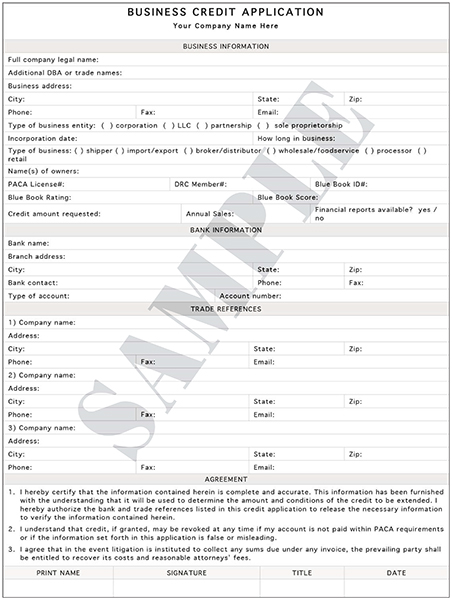As a result, Hapco Farms depends more on outside sources like Blue Book Services and looks to the U.S. Department of Agriculture’s Perishable Agricultural Commodities Act (PACA) for complaints, as well as checking business registrations with the Secretary of State. “Most of the time we don’t do applications,” Brown says, “but we do review customers when we see some unusual activity in the sales or payment pattern.” If pay is disrupted, he notes, “we’ll go back to Blue Book or if there is a credit application, we can call a vendor and see if anything has changed.”
Further, Brown notes, “Since economics are dynamic, things are changing all the time. We update our perspective on the customer regularly—that is, the amount of credit. That’s not something we do with an application, it’s something we do with the public record,” he explains, since an application can list “hundreds of thousands of dollars in a checking account, but what does that really mean? How fast can money leave a checking account? We review customers all the time, if not daily on an as-needed basis.”
 This is where technology comes into play, and can be invaluable. Hapco subscribes to weekly credit updates from Blue Book and “mini reports” from other information sources. Michelle Johnson, the company’s senior credit analyst, will pour over listings, looking for Hapco customers.
This is where technology comes into play, and can be invaluable. Hapco subscribes to weekly credit updates from Blue Book and “mini reports” from other information sources. Michelle Johnson, the company’s senior credit analyst, will pour over listings, looking for Hapco customers.
Del Campo Supreme uses two other sources: Euler Hermes trade insurance and a proprietary system tied to the company’s ordering program. If a customer asks to raise its credit limit, Jimenez looks at pay patterns (such as nonsufficient checks) and if there are any PACA claims against the company. Then she will require a new application to see if the customer can handle the added amount. “We’re pretty strict,” she says, not only due to risk but because collateral is not an option. “We base about 90 percent of our decisions on what Blue Book has on the customer.”



